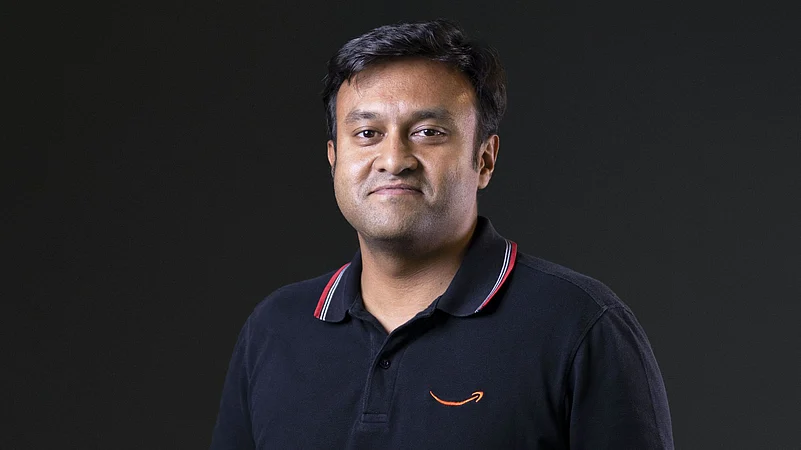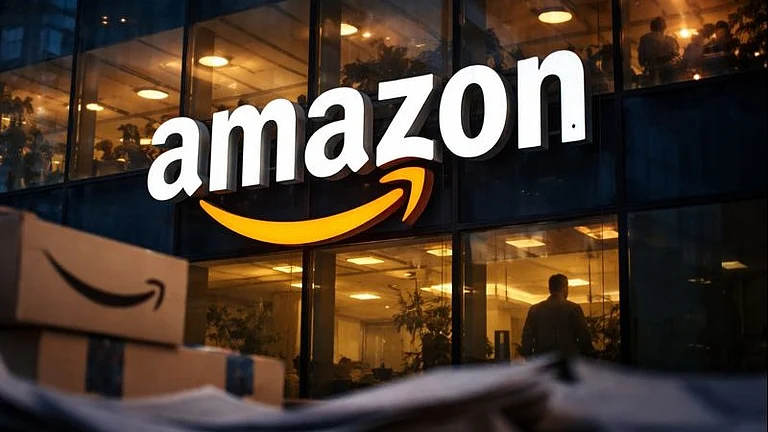A couple of weeks ago, tech giant Amazon’s India unit announced that it was expanding its full-basket grocery service, Amazon Fresh, to more than 130 cities. Amazon Fresh’s expansion comes at a time when competition in the online grocery space is heating up.
The emergence of quick commerce players such as Zomato’s Blinkit, Swiggy Instamart, and Zepto even pushed Tata’s BigBasket to venture into express delivery of groceries with BB Now in March 2022. This came a decade after BigBasket pioneered online grocery shopping through slotted deliveries.
Amazon Fresh operates in a similar slotted delivery segment, with the earliest slot available for its customers within 2 hours of placing the order. Fresh is optimistic about slotted delivery by betting on quality and a wide assortment of products.
In an exclusive conversation with Outlook Business, Amazon Fresh’s director Srikant Sree Ram talks about the expansion of its fulfillment center network, its future trajectory, and the challenges it faces.
Edited Excerpts:
What key differentiators set Amazon Fresh apart from its competitors in this segment?
There are three to four things that are critical for us when it comes to consumers. The first one is the assortment of products. A few months ago, we used to offer around 6,000 products on Amazon Fresh. Today, it's north of 15,000 items and growing.
The other element is the quality, especially of fruits, vegetables, and perishables, because that is something that consumers will never compromise on and should not.
The third thing that keeps us busy is ensuring we can offer the best value to consumers, in terms of not just pricing but also the overall package in terms of customers’ end-to-end requirements.
Finally, we offer the convenience of slotted delivery, which allows consumers to plan their time better. We learned from a report released by research firm LocalCircles last year that for this category (groceries), the most critical element that consumers care about is quality.
Do you feel that quality is going to help you win over customers despite consumer behavior going through a massive shift after the pandemic and the emergence of quick commerce?
It does vary by category. Quality might not be a factor in delivering a mobile phone, but when it comes to groceries, consumers consider that quality is of paramount importance. You cannot get away with that, and it must be the best possible one. Along with that, we are continuously focusing on how we can make not just the assortment but also the buying journey as seamless as possible.
Even BigBasket was forced to join the quick-commerce bandwagon despite starting with slotted delivery. With deep pockets and access to data analytics, does Amazon also plan to do that at some point?
The primary thing for us is to understand what our consumers are telling us, such as if there are things that we need to improve in terms of our service.
Additionally, Amazon.in, as a marketplace, is very uniquely positioned. Amazon Fresh allows you to buy the most frequently ordered products delivered within hours, at a slot that is most convenient to you. On the other hand, the e-commerce platform has a huge selection, with lakhs of products available with same-day delivery. This opportunity to serve every consumer's need, both in terms of scale of selection and speed, is unique to us.
So, it goes back to what we hear from consumers. We have expanded our range in various categories, such as pet care, organic fruits, and vegetables. We look at consumer buying behavior to determine which product should be available on the same day versus the next. At the end of the day, you must make a trade-off at every level since there is only a finite space.
What are some trends you see at Fresh?
We have seen consistent growth in beauty, personal care, and baby-care products. There has been high double-digit growth in each of these areas in the past 12 months. During this summer season, mangoes and beverages have grown in double digits as well. This shows that customers are willing to experiment and widen their online shopping journey beyond what were considered standard categories for e-commerce buying, such as electronics or apparel.
How have the fulfillment centers expanded to cater to 130 cities?
We keep looking at pockets where the quality of our service could get better and decide to expand our fulfillment network there. For instance, a year ago, we realized that in areas around Bengaluru’s Electronic City, the quality of our services is not where it should be. While we had two-hour slots in most areas of the city, we were servicing only four-hour slots in that part of the city. Also, the assortment we offered in other parts was not happening there. Possibly it was a combination of demand as well. So, this year, we set up another FC (fulfillment center) there.
Right now, we have 26 Amazon Fresh centers, and we have partners as well in certain cases. In both cases, we want to prioritize ensuring that the supply chain is wholly and solely monitored by us because quality becomes such an important issue.
Do you also see the need to expand infrastructure, such as logistics around fulfillment centers?
I think there is a need not just to increase fulfillment centers based on demand but also to get enough delivery agents in the workforce under the roof. The demand growing is a problem. So, we continue to work with partners in the logistics space to augment the workforce and ensure that they're able to support our scale.
How do you ensure that the third-party centers are also sticking to your quality standards?
So, it's a combination of SOPs (standard operating procedures) where we ensure that the right procedures are set in place. There is also an audit mechanism that happens in two ways. Firstly, there are different metrics that we track, which are leading indicators of checking whether everything is in place. Secondly, we have periodic visits by trained people.
In some cases, we've also leveraged technology by installing shelf cameras to ensure that monitoring the quality doesn't even need human intervention.
What are some of the biggest challenges you face today?
Being able to meet what our consumers expect of us is a challenge. It's a very challenging business because of the nature of the products. For instance, if a customer gets a slightly rotten potato, even if it's just one out of your half kg or one kg, it's a negative experience, and they might not come back.
We want to ensure that in every customer engagement with Amazon Fresh, they get everything just as they ordered and of the quality they expect. Making sure that as we expand from 60 to 130 cities, the quality doesn't drop is a big challenge.
We are pleased with how we're doing right now, but I think it's something that we need to continue to work on.































